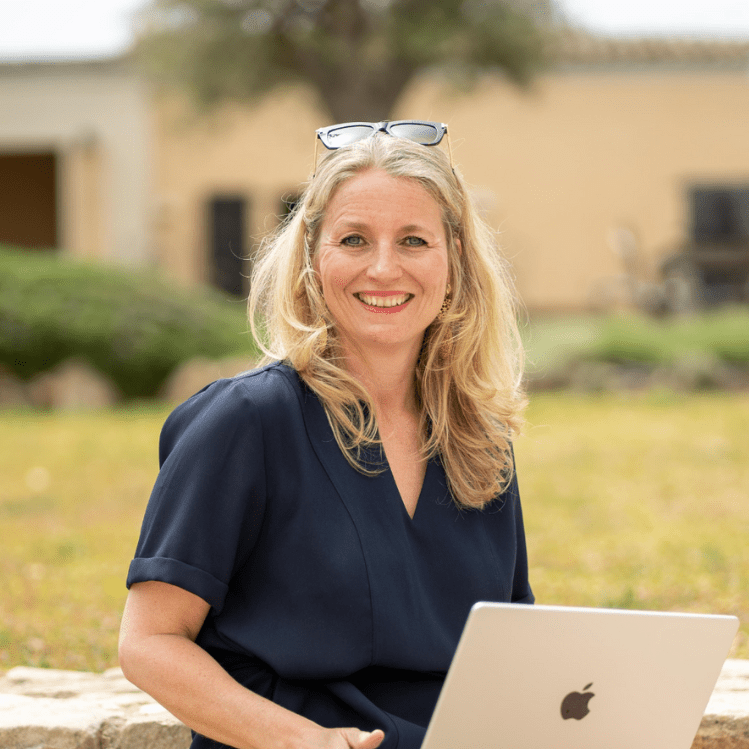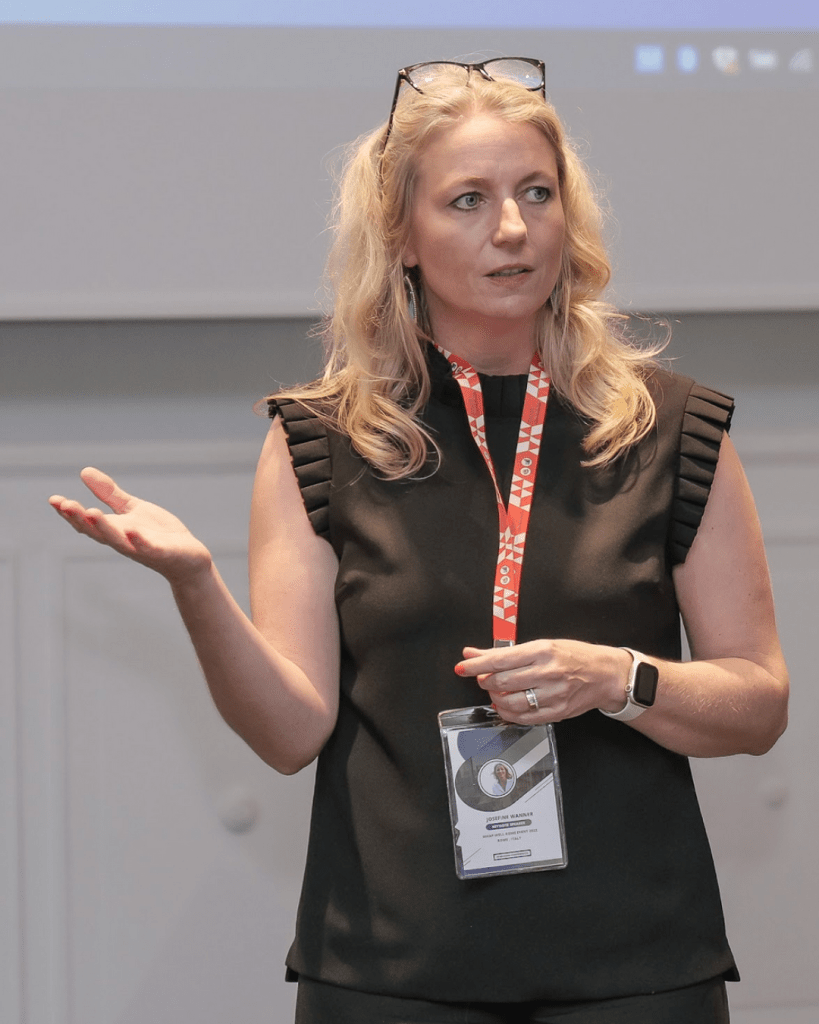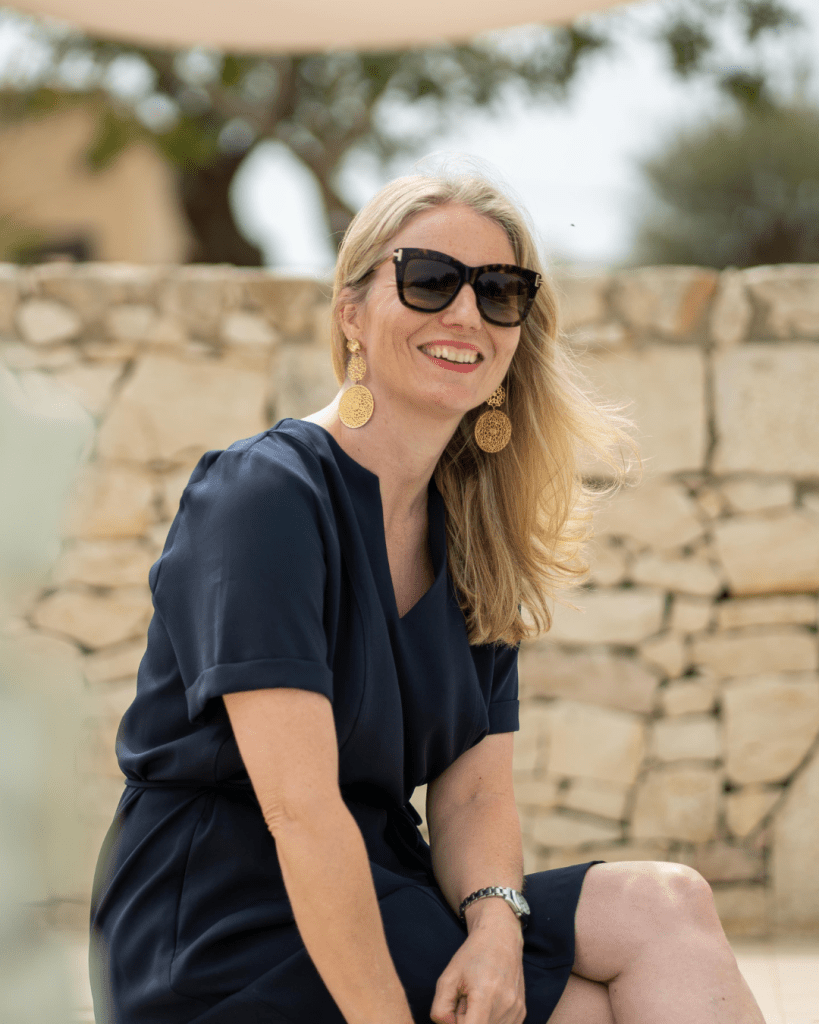
Josefine Wanner: From Corporate Success to Building a Purpose-Driven Business
When Josefine Wanner left behind her thriving corporate career, she wasn’t just walking away from stability, a steady paycheck, and a well-defined path—she was stepping into the unknown. Driven by a desire for freedom, fulfilment, and impact, Josefine transformed her life, building a successful online business from the ground up. Her wake-up call came during a deeply personal moment when her father’s illness reminded her how fleeting life can be. Inspired to take control of her time and energy, she embraced uncertainty and turned it into an opportunity to design a life on her terms. Her journey is one of resilience, courage, and self-discovery, proving that it’s never too late to pivot and create a life that aligns with your purpose.
Your transition from a successful corporate career to building an online business is truly inspiring. What was the most challenging part of that leap for you?

There were two big challenges: embracing uncertainty and figuring out my zone of genius—and then building a profitable business around it.
In the corporate world, everything felt secure: I had a clear job description, a steady paycheck, and a career ladder to climb. When I walked away from that structure, I had to carve my path, which meant becoming comfortable with the unknown.
I also knew that the path I wanted to walk was one leading to financial and time freedom and that the key to achieving this was to build a successful online business. Yet, I had no clue how to get there or where to even start.
The first two years felt like I was constantly outside my comfort zone—suddenly, every decision was mine.
But that same fear became the fuel that pushed me to grow in ways I never thought possible. Once I accepted uncertainty as part of the journey, it became exciting instead of frightening.
You mentioned that your father’s illness was a wake-up call. How did that experience shape your perspective on life and your career choices?
When I Googled my father’s diagnosis, I learned that, on average, he might have only three more months to live—and in reality, he got just six weeks. It was a stark reminder that life is often far shorter than we imagine. I had already started thinking about becoming an entrepreneur; I was counting down the days until retirement, which was still 20 years away. That’s a terrible way to live, but fear kept me stuck.
My father’s diagnosis catapulted me out of that paralysis. It prompted me to ask, “If I only had a limited amount of time, what would I truly want to do with it?” That question changed everything. I stopped chasing the external validation of a corporate title and started seeking fulfilment and impact. It gave me permission to take risks, trust my intuition, and prioritize what matters—in both my career and personal life.
Can you share more about the specific mindset shifts you had to make when transitioning from a corporate job to pursuing your passion?
I believe we have to fear the current situation more than we fear the unknown.
If the unknown feels scarier than where we are now, we’ll stay put. My wake-up call made me think, “If I don’t leave now, I might never get out.” Maybe that was overdramatic, but it was exactly what I needed.
One of the biggest shifts was moving from a fixed mindset to a growth mindset. In my corporate role, I was used to clear metrics, defined goals, and little tolerance for mistakes. On my own, I had to be prepared to make mistakes—often publicly—and learn from them quickly. Instead of trying to be perfect, I focused on progress. “Better done than perfect—always!”
Another crucial shift was learning to trust myself. I had to stop looking to others for validation and start believing that my voice, my expertise, was enough. Understanding my values gave me the courage to keep going even when results weren’t immediate.
In your work, you help coaches, course creators, and service providers grow their businesses. What is the number one mistake most entrepreneurs make when starting their journey?
They try to serve everyone. It’s tempting to cast a wide net and say, “I can help anyone who needs my service,” especially when you have broad training or education.
But potential clients don’t see it that way; they want a specialist.
Just like we’d prefer a specialist for a medical issue, customers want someone who truly understands their specific problem.
When you try to speak to everyone, you end up connecting with no one.
My advice is to get super clear on your niche: Who do you serve, and how do you solve their specific problem?
That clarity makes it easier to nail your messaging, attract the right clients, repel the wrong ones, and stand out in a crowded market.
Your story is filled with resilience, especially after being diagnosed with cancer. How did your personal experience with health challenges influence your approach to entrepreneurship?

My diagnosis taught me that every moment is a gift and that I’m capable of overcoming far more than I ever thought. When I returned to building my business after treatment, I had this unshakable conviction that nothing in business could ever truly “kill” me. If I could face cancer, I could face any hurdle entrepreneurship threw my way.
It also made me far more intentional about how I spend my time. I wanted a business model that supports my health and well-being, not one that drains it. It wasn’t just about hustling; it was about building a life and career where my priorities—health, family, impact—could coexist harmoniously.
Am I exactly where I want to be yet? Not. I still work too many hours sometimes, because as an entrepreneur, you can always do more. It’s crucial to set clear boundaries and avoid the “employee mindset” where working harder automatically means making more. With the right business model, including scalable offers, you can help more people, earn more, and still work less.
What advice would you give to someone who feels trapped in a career they don’t love but is afraid to leap into something new?
Start by testing whether there is demand for your ideas. I wouldn’t advise quitting your job like I did—that can create unnecessary stress. Instead, test the waters of a new path: launch a side project, join a network of other business owners, offer a service on a freelance basis, or take an online course in a field you’re passionate about. Dip your toes in first.
This does two things: it builds your confidence and provides real data on whether your new direction is viable. Fear often shrinks when it faces concrete evidence that “Yes, this can work.” And remember: inaction has a cost, too. If you’re feeling unfulfilled, staying put can turn out to be the bigger risk in the long run.
You speak about the power of building a business that removes time constraints and money caps. What steps do you recommend for someone to start creating this kind of freedom in their own life?
First, identify the core strengths and knowledge you can package into a leveraged offering—like an online course, group coaching program, or digital product. This allows you to step away from trading hours for dollars. Launch one product at a time, test it, improve it, and make it better. Then relaunch the same product again and again.
I learned this lesson the hard way. Funnily enough, my constant desire to “fix” every minor issue turned me into a specialist in launching online offers, but it also meant I never gave each offer the chance to reach its full potential.
Instead, focus on solving one problem for one ideal client with one solution, and use one sales strategy to sell it—repeatedly.
Next, build systems. Automate or outsource tasks that aren’t in your zone of genius so you can free up mental space for higher-level thinking and creativity. Finally, consistently market yourself in a way that scales—whether through social media, email marketing, or strategic partnerships. It’s not about working nonstop; it’s about designing a business that can thrive without you having to be in the trenches every single minute.
What are the key elements of a successful coaching or service-based business, in your experience? How do they differ from traditional corporate business models?
In coaching and service-based businesses, relationships are everything. You need deep empathy and the ability to create real transformation for clients. This level of personalization differs from corporate models, which are often more transactional and process-driven.
Another key element is authenticity: people are buying into you as much as your expertise. Sharing your story, values, and personality helps you build trust and stand out. Lastly, agility is crucial—you can pivot quickly based on client feedback, market changes, or personal passions. In a corporate setting, making changes can feel like steering a giant ship; in a small business, you can change direction much faster.
And never stop learning. What you learn, you can immediately pass on to your clients, creating a continuous cycle of growth.
You emphasize the importance of helping others and making an impact. How do you measure success in your own business, and how do you teach your clients to do the same?
I look at two main factors: my fulfilment and my clients’ transformations.
Revenue is important—it keeps the business running, and when you make more money, you can help more people, hire staff, and donate to causes you care about.
But if I’m not personally fulfilled or my clients aren’t seeing results, no amount of money can compensate for that.
For instance, if every client drains your energy, you’ll soon resent working with them.
Instead, identify your “crush” clients—the ones you love working with—and focus on them.
One of my clients had a list of 80 past clients but realized that only 8 of them were truly ideal. We used that insight to fine-tune her offerings and messaging.
I encourage my clients to define their version of success early on. Some prioritize flexibility for family, others have specific revenue goals, and still others focus on social impact. By clarifying these values, we craft a business strategy that aligns with what genuinely fulfils them.
Looking back on your journey, what are some key lessons you learned that you wish you could have told your younger self before you made the career shift?

I’d tell myself to trust my instincts sooner. I spent too long seeking external approval, even though I knew deep down what I wanted. I’d also say, “Your worth isn’t tied to a job title, and the world is huge! Travel first, figure out what you want to do second.”
It took me a while to separate my identity from my corporate role. And finally, I’d remind myself that it’s okay to change paths. Society often sees career changes as failures, but they’re opportunities to grow and align with your purpose. Every pivot brings new lessons and opens doors you never knew existed. Embrace it—you’ll be glad you did.
APPLY TODAY
100 Top Global Women Entrepreneurs – Global Woman Magazine
Our Journey in 12 Months:
Our Journey in 12 Months – Global Woman Magazine
5 Things That Show Money is Not Evil:
5 Things to Show That Money Is Not Evil – Global Woman Magazine
Global Man Magazine Page:
Global Woman, Global Man: Socials:
Global Woman Magazine (@global_woman.magazine) • Instagram photos and videos






